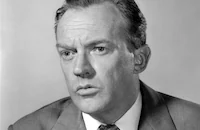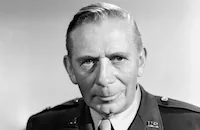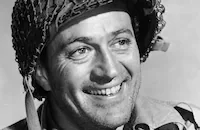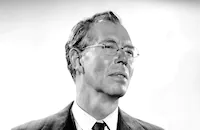The Desperate Hours

Brief Synopsis
Cast & Crew
William Wyler
Humphrey Bogart
Fredric March
Arthur Kennedy
Martha Scott
Dewey Martin
Photos & Videos
Film Details
Technical Specs

Synopsis
In the suburbs of Indianapolis, Indiana, the Hilliard family¿father Dan, mother Eleanor, nineteen-year-old daughter Cindy and young son Ralphie¿start their weekday in typical fashion. After Ralphie leaves for school, and Dan, a department store executive, drives to work with Cindy, Eleanor cleans house while listening to a radio broadcast about three escaped convicts. Unknown to her, the convicts, led by Glenn Griffin, a vicious criminal with a vendetta against sheriff's deputy Jesse Bard, are at that moment driving down her street. Noting Ralphie's bicycle in the front yard, Glenn decides to hide out in the Hilliards' house, and he and his cohorts¿younger brother Hal and the dimwitted but brutal Samuel H. Kobish¿take Eleanor by surprise and stash their getaway car in the garage. Jesse, meanwhile, learns of the escape and joins FBI agent Carson to deduce the convicts' whereabouts. At the Hilliards', Glenn, who possesses the convicts' only weapon, pressures Eleanor into revealing where Dan stores his gun. Glenn then makes Eleanor place a long-distance phone call using a phony name, and talks with girl friend Helen Miller about delivering some money to the house that night. Later, Dan and Cindy return home and are horrified to discover Eleanor being held at gunpoint by Glenn. After Glenn explains to Dan that he and the others will leave peacefully once the money arrives, Ralphie shows up and is terrorized by Kobish. Dan instinctively lunges for the convict but is struck and subdued by Glenn. Later, Ralphie questions his father about an escape plan and is disappointed when Dan admits he is afraid. Jesse and the police, meanwhile, discover Helen's location and send out an alert to have her followed, but not apprehended. At the Hilliards', Cindy's boyfriend Chuck telephones to announce he is coming over. Before Chuck arrives, Glenn sends Dan to the nearest gas station for gas, bourbon and a newspaper, warning him not to do anything that would endanger his family. While Cindy takes a drive with Chuck and pretends all is well, Dan contemplates phoning the police at the gas station, but instead presents Glenn with two bottles of bourbon. Realizing Dan wants to get him drunk, Glenn smashes one bottle and warns Dan not to "think too much." After saying goodnight to Chuck, who assumes that her tenseness is due to her father's disapproval of him, Cindy is accosted by Kobish. Hal, who is attracted to Cindy, stops the unarmed Kobish, and Kobish storms off in frustration. Worried about Kobish's erractic behavior, Glenn follows him outside and knocks him out, and while he is gone, Cindy pretends to faint in the foyer. When Hal bends over to help her, Cindy bites his hand, and Dan grabs his gun and pushes him out the door. The Hilliards' victory is short-lived, however, as gun-wielding Glenn catches Ralphie climbing out his bedroom window and reclaims control of the situation. At the sheriff's station, meanwhile, Jesse and Carson learn that Helen was stopped briefly for a traffic violation outside Columbus, Ohio, and is no longer driving west. Upset, Jesse has all long-distance phone calls between Columbus and Indianapolis monitored. At the Hilliards', Glenn receives a call from Helen, who is holed up outside Columbus, and arranges to send him the money special delivery. The next morning, Glenn orders Dan and Cindy to go to work, but insists that Ralphie stay home. Before Dan and Cindy depart, Glenn announces that Helen is sending the money to Dan's office and warns him again not to try anything. In the car, Cindy questions whether they should contact the police, but Dan insists they cannot take chances. Back at the Hilliards', trashman George Patterson shows up to collect the garbage and notices the convicts' beat-up car in the garage. Glenn sees George studying the vehicle and orders Kobish to jump on the back of the trashman's departing truck. Kobish soon hijacks George and forces him at gunpoint to drive to the countryside. Fearing the worst, George jumps from the moving truck, which then crashes, but Kobish scrambles out of the wreck and shoots George. Dan, meanwhile, waits nervously for his mail and arranges for a note to be delivered to the neighborhood police station. From a golf course, Kobish telephones Dan at work and threatens to shoot up the place unless Dan picks him up. Dan arrives home with Kobish and finds Miss Swift, Ralphie's teacher, chatting with Eleanor, while Glenn and Hal hide. Sure that Ralphie has tried to slip Miss Swift a plea for help, Dan prevents her from leaving with Ralphie's composition book. Dan then persuades Glenn to use him as a hostage once they leave the house, instead of his family. Having discovered George's body, Jesse, Carson and the police, meanwhile, deduce the convicts' general location based on George's trash route, and set up headquarters at a neighborhood diner. When Jesse receives Dan's unsigned note, which alerts the police to the family's plight without revealing their location, Jesse and acting sheriff Fredericks argue about how to handle the criminals. Later, Chuck drops Cindy off at home, but worried, circles the block in his car. Fearful and guilt-ridden, Hal finally tells Glenn he is taking off, and although he disagrees with his brother's decision, Glenn gives Hal some money. Hal hijacks a car and when he hears on the radio that the police have narrowed their search area, forces the driver to stop at a restaurant. Before he can warn Glenn by phone, Hal encounters an armed deputy and shoots him in a panic. Hal then dashes across the road and is struck and killed by a truck. At the same time, Dan learns that Helen's letter has arrived and takes a taxi to the store. The police then catch Chuck circling the area and bring him to the diner just as word comes that Hal's body has been identified and his gun, traced to the Hilliards'. Deeply concerned, Chuck telephones Cindy and, without revealing anything, tells her to expect him. At the front door, Chuck yanks Cindy outside before Glenn can react and drives off with her. A taxi then drops off Dan a block from his house, and he is intercepted by police, who are operating out of a neighbors' attic. Although Dan wants to give Glenn the money to assure his family's safety, Sheriff Masters, who has just arrived on the scene, orders the house be stormed. With Jesse's blessing, Carson overrules Masters and gives Dan a gun, which Dan then empties. Glenn soon finds the gun on Dan and goes upstairs to retrieve Eleanor and Ralphie, whom he has decided to take with him. After startling Kobish, Dan slams the door on his hand, grabs his gun and pushes him outside, where he is shot by police snipers. Dan instructs Eleanor to run next door, then confronts Glenn, who is holding Ralphie at gunpoint. When, at Dan's urging, Ralphie runs to his father's arms, Glenn fires his gun but discovers too late that it is empty. With Ralphie safe, Dan contemplates shooting Glenn, but instead tosses him down the stairs. Outside, Glenn attempts to trick the police and is gunned down in a hail of bullets. Later, their ordeal finally over, the Hilliards embrace and retreat to their reclaimed home.

Director

William Wyler
Cast

Humphrey Bogart

Fredric March

Arthur Kennedy

Martha Scott

Dewey Martin

Gig Young

Mary Murphy

Richard Eyer

Robert Middleton

Alan Reed

Ray Collins

Whit Bissell

Ray Teal
Michael Moore

Don Haggerty
Ric Roman
Pat Flaherty

Beverly Garland
Louis Lettieri

Ann Doran
James Lilburn
Burt Mustin
Joel D. Smith
Mike Mahoney

Walter Baldwin
Edmund Cobb
Joe Flynn
John Benson
Donald Kerr
Paul E. Burns
Helen Kleeb
Ralph Dumke
Paul Salata
Fred Fosler
Crew
C. C. Coleman Jr.
Sam Comer
Jay Dratler
Farciot Edouart
Fred S. Fosler
John P. Fulton
Lee Garmes
Grace Gregory
Hugo Grenzbach
Joseph Hayes
Edith Head
Joseph Macmillan Johnson
Gail Kubik
Winston Leverett
Hal Pereira
Robert Swink
John Waters
Wally Westmore
Robert Wyler
William Wyler

Photo Collections
Film Details
Technical Specs

Articles
The Desperate Hours (1955)
As the story opens, a convict named Glenn Griffin (Bogart) escapes from prison with his kid brother, Hal (Dewey Martin), and fellow prisoner, Kobish (Robert Middleton), in tow. The men eventually enter a tidy suburban home, where they take a middle-class family hostage. The father, Dan Hilliard (Fredric March), is forced to watch as the convicts psychologically and physically abuse his wife (Martha Scott), 10 year-old son (Richard Eyer), and teenage daughter (Mary Murphy). But Glenn and his cohorts aren't going anywhere until some money is delivered to the home by his girlfriend. Wyler sees to it that the pressure reaches an unbearable level, until Hilliard is forced into action.
Bogart attempted to purchase the rights to the popular 1954 novel, The Desperate Hours, for himself, but quickly agreed to do the picture when Paramount outbid him. Although his role was originally written for a much younger man (30 year-old Paul Newman played the role on Broadway, shortly after the movie wrapped production), author Joseph Hayes, who adapted his own novel to the screen, realized that there might be a more antagonistic relationship between the escaped convict and the head of the household if the two men were closer in age. So he happily re-wrote the character to accommodate Bogart. (Wyler badly wanted Spencer Tracy to play the role that finally went to March, but couldn't convince either Tracy or Bogart to accept second billing!)
Wyler and Hayes aimed to generate a slightly different kind of tension with The Desperate Hours than you get in most thrillers. In the opening act of the film, Wyler noted, "the audience wants to see the police reach the criminals. Then it wants this even more strongly when the criminals enter the house. It watches the police work, get closer, become stymied. But it slowly dawns on the audience that things might be much worse for the Hilliards if the police do come. Still, is there any way out if the police do not come? By forcing the audience to face this question, we force them into Dan Hilliard's mind. They take on Dan's anxiety." This masterstroke lends the film an almost nightmarish quality.
But getting it on celluloid wasn't always easy. The Desperate Hours was filmed from mid-October until December of 1954. On the first day of shooting, Paramount invited a gathering of name actors to the set to generate some advance publicity. Wyler, who was widely known to film the same scene over and over again until he found exactly what he was looking for, didn't disappoint: the director forced March and Scott to kiss each other goodbye at the front door no less than 50 different times!
Scott eventually approached Wyler and asked him if she was doing something wrong. Wyler replied that she was fine, but he was trying to wear March out because he was supposed to be late for work and needed to have a "harried" look on his face. After this rather ridiculous display of power, at least one of the visiting actors, Rod Steiger, decided that he would never, ever work with William Wyler. And he kept his promise to himself, by later turning down a role in Wyler's proposed adaptation of Thomas Wolfe's Look Homeward Angel.
However, like many other actors who worked on the famed director's pictures, Fredric March always supported Wyler's methods: "It's easier to know that Wyler is Hollywood's finest director of actors than it is to explain it. He doesn't articulate his criticism. But you sense his dissatisfaction. He seems to know when there's more to be gotten than you're giving. And he's relentless until he has it. The released print is the deferred proof."
Producer: William Wyler
Director: William Wyler
Screenplay: Joseph Hayes (based on his novel and play)
Cinematography: Lee Garmes
Editor: Robert Swink
Music: Gail Kubik
Art Design: Hal Pereira, Joseph McMillan Johnson
Set Design: Sam Comer, Grace Gregory
Special Effects: John P. Fulton, Farciot Edouart
Costume Design: Edith Head
Makeup: Wally Westmore
Cast: Humphrey Bogart (Glenn), Fredric March (Dan Hilliard), Arthur Kennedy (Jesse Bard), Martha Scott (Eleanor Hilliard), Dewey Martin (Hal), Gig Young (Chuck), Mary Murphy (Cindy), Richard Eyer (Ralphie), Robert Middleton (Kobish), Alan Reed (Detective), Bert Freed (Winston), Ray Collins (Masters), Whit Bissell (Carson).
B&W-112m.
by Paul Tatara

The Desperate Hours (1955)
Martha Scott, 1914-2003
Martha Ellen Scott was born in Jamesport, Missouri on September 24, 1914, and raised in Kansas City, where a high school teacher encouraged her interest in acting. She majored in drama at the University of Michigan and after graduation, she joined The Globe Theatre Troupe, a stock company that performed truncated Shakespeare at the Chicago World's Fair in between 1933-34. She went to New York soon after and found work in radio and stock before playing making her breakthrough as Emily Webb in Our Town. When the play opened on Broadway in February 1938, Scott received glowing reviews in the pivotal role of Emily, the wistful girl-next-door in Grovers Corners, New Hampshire, who marries her high school sweetheart, dies in pregnancy and gets to relive a single day back on Earth. Her stage success brought her to Hollywood, where she continued her role in Sam Wood's film adaptation of Out Town (1940). Scott received an Academy Award nomination for best actress and was immediately hailed as the year's new female discovery.
She gave nicely understated performances in her next few films: as Jane Peyton Howard in Frank Lloyd's historical The Howards of Virginia (1940), opposite Cary Grant; the dedicated school teacher in Tay Garnett's Cheers for Miss Bishop (1941) in which she aged convincingly from 17 to 85; and as a devoted wife to preacher Frederic March in Irving Rapper's warm family drama One Foot in Heaven (1941). Sadly, Scott's maturity and sensitivity ran against the glamour-girl persona that was popular in the '40s (best embodied by stars like Lana Turner and Veronica Lake) and her film appearances were few and far between for the remainder of the decade.
Her fortunes brightened in the '50s, when she found roles in major productions, such as a suburban wife trapped in her home by fugitives, led by Humphrey Bogart, in William Wyler's taut The Desperate Hours (1955) and played Charlton Heston's mother in the Cecil B. Demille's The Ten Commandments (1956) and again for William Wyler in Ben-Hur (1959). Scott found steady work for the next 30 years in matronly roles, most notably on television, where she played Bob Newhart's mother on The Bob Newhart Show (1972-1978) and the mother of Sue Ellen Ewing on Dallas (1978-1991). Her second husband, pianist and Pulitzer Prize-winning composer Mel Powell, died in 1998. Survivors include a son and two daughters.
by Michael T. Toole
Martha Scott, 1914-2003
Quotes
Trivia
Fredric March's part was intended for Spencer Tracy, a good friend of Humphrey Bogart's, but neither Tracy nor Bogart was willing to concede top billing to the other.
The exterior of the house used in the film is the same set used as the Cleaver home in the TV series "Leave it to Beaver" (1957).
Humphrey Bogart's last tough-guy role.
The first black and white movie in VistaVision.
The Character of Glenn Griffin was made older so Humphrey Bogart could play the role. The stage version starred Karl Malden and a young Paul Newman in the Bogart role
Notes
Joseph Hayes's best-selling novel was first published in Collier's. Hayes's stage version of the story, starring Karl Malden as "Dan" and Paul Newman as "Glenn," did not open on Broadway until February 19, 1955, shortly after shooting on the film was completed. Both the novel and the play are credited onscreen as sources, however.
As noted in a July 1956 Variety article, Hayes's story was inspired by the real-life hostage-taking of Pennsylvania residents James J. and Elizabeth Hill, who, in 1952, were held captive in their home by escaped federal penitentiary convicts. The incident was chronicled in a February 1955 Life magazine article. According to the Variety article, the Hills filed a $300,000 right to privacy lawsuit against Hayes, Paramount and novel publisher Random House, among others, claiming that the Life article, which identified their ordeal as the basis of Hayes's story, embarrassed, distressed and injured them through unlawful use of their names and photographs. The Hills argued that the article, by comparing the play and novel to their ordeal, gave the false impression that they had been abused by their captors. Although the convicts did not, in fact, harm them, the Hills wanted no reminders of the crime and had moved to another state. They refused to grant permission to publish articles about the incident and did not endorse the Life piece. Judge Saul S. Streit dismissed the complaint, noting that while Hayes was authorized by Random House to take part in promotional activities regarding the book, the Hills had not sufficiently shown that Random House was responsible for the article's publication. Streit permitted the Hills to submit an amended complaint, but the final outcome of the suit is not known.
In an October 8, 1955 New York Times item, reviewer Bosley Crowther charged that the film was irresponsible and unbelievable because it portrayed the police as grossly incompetent and untrustworthy. Hayes responded to Crowther's accusations in a October 16, 1955 column, noting that during the real-life event that inspired the book and play, a prison escapee held a young child hostage at knifepoint and threatened to harm him if the police shot at him. One policeman did shoot, and the convict stabbed and killed the child. To which real-life event Hayes is referring is unclear, however.
According to a May 1954 Daily Variety item, Humphrey Bogart, through his Santana film company, attempted to purchase the Hayes's novel but was outbid by Paramount. Bogart had played a role similar to "Glenn Griffin" in The Petrified Forest, the 1936 film that made him a star (see AFI Catalog of Motion Pictures, 1931-40). Modern sources claim that Hayes signed with Paramount because the studio agreed to hire him to write the screenplay and because of director William Wyler's reputation. Wyler had read Hayes's novel in manuscript form and, according to modern sources, asked Paramount to buy it. According to February 1956 correspondence from the Screen Writers Guild, contained in the file on the film at the AMPAS Library, John Mock and Elizabeth Eberhardy were incorrectly credited in an April 1955 Screen Achievements Bulletin listing as contributing to the screenplay's construction along with Jay Dratler.
Modern sources state that Wyler originally wanted Gary Cooper or Henry Fonda to play Dan, and Marlon Brando or James Dean to play the part of Glenn, who in the stage version, was a young man. Modern sources also claim that Wyler asked Spencer Tracy to portray Dan, but when Tracy and Bogart could not agree on screen billing, cast Fredric March, who had starred in his 1946 film The Best Years of Our Lives (see AFI Catalog of Feature Films, 1941-50). As noted in news items, Raymond Burr was cast in the film, but had to drop out due to scheduling conflicts with You're Never Too Young . News items announced that Richard Erdman had been cast in the role of a reporter, and Erdman is listed in Hollywood Reporter production charts, but neither he nor his character appear in the final film. Arthur Franz also was announced as a cast member in Hollywood Reporter, but he, too, was not in the final film. Hollywood Reporter news items add Jesslyn Fax and Ed Ralph to the cast, but their appearance in the final film has not been confirmed. Night exteriors were shot on Universal Studios' back lot, according to modern sources, and a thoroughly furnished, seven-room house was built on the Paramount lot for the film's interiors.
Despite generally good reviews, The Desperate Hours was a box office failure. On December 13, 1967, the ABC television network broadcast a version of Hayes's play, directed by Ted Kotcheff and starring Arthur Hill, Teresa Wright and George Segal. In 1990, Michael Cimino directed a remake of The Desperate Hours, titled Desperate Hours. The MGM-UA release, for which Hayes received an onscreen writing credit, starred Mickey Rourke, Anthony Hopkins and Mimi Rogers.

Miscellaneous Notes
Voted Best Director by the 1955 National Board of Review.
Released in United States Fall November 1955
Remade with the same title in 1990, directed by Michael Cimino and starring Mickey Rourke and Anthony Hopkins.
VistaVision
Released in United States Fall November 1955













